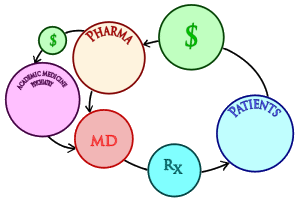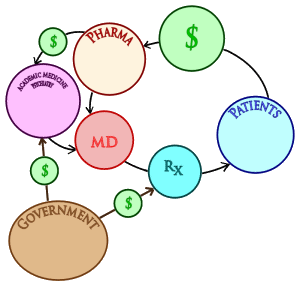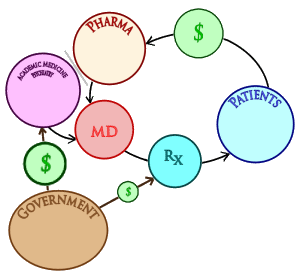Anyone who knows me would be glad to confirm that when it comes to money, I’m in the Dunce corner. It’s an incurable affliction – proving that knowing the "cause" doesn’t necessarily lead to a cure. The cause was simple – a father who grew up poor and was determined to teach me the ways of barter and wise money management. The result was also simple – a thick film that descends where barter and money management are concerned. The cure? Marry well – honest and tending towards frugality. That said, listening to Dr. Desmond-Hellmann in the video of the last post talk business-ese, I was mildly surprised that I knew what she was talking about [they didn’t teach doctors to talk that way in my medical school]. "We need to go after PHARMA alliances to support our Academic Enterprise." Wiping the film away briefly, I remember the predicament of our Psychiatry Department at Emory in the days before I left and Dr. Nemeroff later appeared. In my day, we were hand to mouth, near beggers. Ten years later, the place was in high cotton. It’s not that hard to figure out how it happened. So I drew me a diagram:

Not bad for a Dunce, I thought. The trade off Dr. Desmond-Hellmann was proposing was to go after the PHARMA money to support her Academy. The part she left out was the one this and other blogs are about – the influence on the prescribing doctors that PHARMA purchases with this solution can be a disaster. It certainly has been in Academic Psychiatry – something close to cancer. But my diagram was too simplistic [Duh!]. For one thing, it left out Government. I’ve always thought that the excessive profits made by PHARMA were "taxation without representation." The sick are a captive audience and those profits are paid by the sick – they’re the ones getting taxed, but the taxes don’t go to the government – they go to PHARMA. PHARMA in turn supports Academia to help them with the big profits. The sick are being taxed to support Academia? Something’s wrong with that picture. And adding in Government doesn’t help:

Government supports Academia, and pays an increasing piece of the medication bills. Government is being taxed to support PHARMA profits? It certainly was true in TMAP. It’s certainly true with Medicaid and Medicare. It will certainly be true with Obamacare. So next, I added what I think we ought to do – put a firewall between PHARMA and Academia:
If we cut off the PHARMA to Academia conduit, the Government will have to fill in the gap. Where will the money come from? Pay less for drugs, but that wouldn’t just automatically happen so the government would have to intervene more. Price controls? With that, I can feel the film descending and want to put one last thought on paper before the screen goes blank. It’s a thought about Clinical Trials for FDA approval of new drugs.
What about putting the firewall in place between Academia and Industry, then having a two-step FDA Approval process. Let PHARMA do what they’re doing with their Clinical Trials and submit to the FDA who gives a tentative go ahead. Then the FDA farms out a further Clinical Trial[s] to Academia [on bid? rota?] paid for by [PHARMA? Government? PHARMA + Government?]. Make the data from that independent Clinical Trial[s] totally transparent and required for final FDA Approval. It doesn’t solve the drug pricing problem, but it might iterate towards honesty, and it puts Academia in the loop it ought to be in. If the Academic Institution cheats, ban them from the process and its rewards.
The film has descended, and I always knew that I wasn’t going to be the one to solve the problem anyway. I just thought that my brief window of thinking about this might stimulate those without my fiscal afflictions to think about ways to restore the balance in the universe that we all know needs to be in place with realistic checks and balances…



I’m not a physician, but as a citizen find your posts important. Academia in general is trying to make up for reduced government expenditure from the marketplace. A firewall between Pharma and academic medicine would be a good thing. But alas, medicine is not the only field where money corrupts academic honesty. A firewall between Pharma and academic medicine won’t work in isolation; the whole academy is in crisis. Reclaim UC is a good blog addressing this crisis.
J Z Sadler has just published an interesting chapter in a book edited by Joel Paris, which has been released a few weeks ago. The title of the chapter is: “Considering the economy of DSM alternatives.” It is a ruthless analysis; a sophisticated elaboration of your entry. It can be accessed freely (Chapter 2 of the book Making DSM-5. Concepts and controversies).
fyi a change … something of a positive note
Kaiser mental health care lacking, state says; HMO hit with $4 million fine
ccraft@sacbee.com Published Wednesday, Jun. 26, 2013
“• A FAQ sheet for Kaiser in Northern California says: “We offer brief, problem solution-focused individual counseling. Research shows many people improve in a single visit. … We do not offer long-term individual psychotherapy at Kaiser.”
• Kaiser’s website for its Northern California Department of Psychiatry says: “In general, we do not begin treatment with individuals whose problems are of such a long-standing nature that short-term treatment would probably not be helpful. We will refer such individuals (elsewhere), although this treatment will not be a Kaiser-covered benefit and will not be paid for by Kaiser.”
• Kaiser has failed to ensure that appointments for mental health care are offered in a timely manner, making patients wait too long between visits.
Managed Health Care officials said advising patients that long-term psychotherapy is unavailable violates the state’s mental health parity law. The law says that mental illness must be treated on par with physical illnesses.”
http://www.sacbee.com/2013/06/26/v-print/5524446/kaiser-mental-health-care-lacking.html
Re: Sadler’s chapter in “Making the DSM-5: Concepts and Controversies”
John Sadler is a professor of psychiatry at UT Southwestern. This chapter is an important step in the unyoking of the university’s department of psychiatry from commercial interests.
The bloggers at Health Care Renewal have written extensively about this issue for years.
I’m not so sure this idea in the post above is any solution…give tax payer dollars to academia to act as check on Big Pharma’s dirty little clinical secrets. Or in other words providing a government subsidy to an already deeply corrupt and greed filled system to act as a incentive or reward for acting with honesty, integrity, and ethical behavior…basically paying a bribe to academia to do what they should be doing first…This just comes across to me personally as further perpetuating a failed and corrupt system that is already operating with impunity…If that isn’t in the DSM5..it should be…under the category of just plain NUTS…
Here’s how to really turn things around…
The 10 point starter kit
1. For an approval, a drug or device must show it is a significant improvement over all existing treatments…the time has come to demand higher standards..not just better than simply nothing..that shell game has run it’s course and has proved a complete disaster…not only should the standards and bar be raised…it should be retroactive to the late 1970’s, when this ill conceived public health train wreck was implemented…
2. No more serving two masters…you can not work for a public institution and work for corporate America at the same time..the days of created KOL’s and unquenchable greed in our public higher institutions of learning must end…
3.if PHARMA wants academia to conduct research or clinical trials..they can be free to supply funding…and that’s it…no other influence…the rest of the job must be completely independent and transparent…
4.Abolish the NIH and NIMH…their time has passed….enough government dollars disappearing down corporate & corrupt bureaucratic rabbit holes….
5. No patents given on publicly funded research and discoveries…time for all of academia to begin serving a higher purpose, the people of this nation, and the greater humanity..these are their real investors that have been getting cheated and robbed blind for decades…..
6. – 10. accountability, accountability, accountability, and more accountability….
it should be retroactive to the late 1970?s, when this ill conceived public health train wreck was implemented…
Stan–What an idea! (BTW, if we could look back to the 1970’s, we could demolish Eli Lilly’s hype that rDNA insulin was “just like the human body makes” and “better than animal insulin.” Perhaps we could do some true efficacy studies and even reintroduce natural insulin for needful diabetics. In the patent literature for genetically-engineered insulin, researchers identified “bovine ultralente insulin” as the gold-standard for basal control. As soon as synthetic insulin gained FDA approval . . . Lilly (almost) immediately withdrew the gold-standard comparator from the marketplace.
I still claim that Lilly drew the road map with their rDNA insulin approval and promotion; Prozac was the next to follow that path. And the rest, as they say, is history.